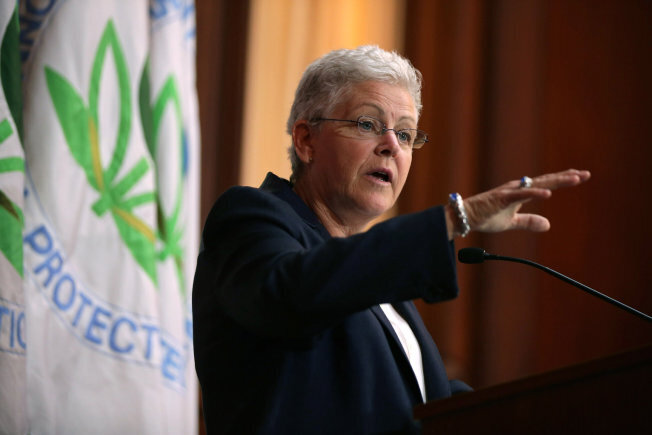The full text of EPA Administrator Gina McCarthy’s speech introducing
the draft rule for greenhouse pollution from existing power plants, June
2, 2014.
 About a month ago, I took a trip to the Cleveland
Clinic. I met a lot of great people, but one stood out—even if he needed
to stand on a chair to do it. Parker Frey is 10 years old. He’s
struggled with severe asthma all his life. His mom said despite his
challenges, Parker’s a tough, active kid—and a stellar hockey player.
About a month ago, I took a trip to the Cleveland
Clinic. I met a lot of great people, but one stood out—even if he needed
to stand on a chair to do it. Parker Frey is 10 years old. He’s
struggled with severe asthma all his life. His mom said despite his
challenges, Parker’s a tough, active kid—and a stellar hockey player.
But sometimes, she says, the air is too dangerous for him to play
outside. In the United States of America, no parent should ever have
that worry.
That’s why EPA exists. Our job, directed by
our laws, reaffirmed by our courts, is to protect public health and the
environment. Climate change, fueled by carbon pollution, supercharges
risks not just to our health, but to our communities, our economy, and
our way of life. That’s why EPA is delivering
on a vital piece of President Obama’s Climate Action Plan.
I want to thank Janet McCabe, our Acting Assistant Administrator at the
Office of Air and Radiation, and the entire
EPA team who worked so hard to deliver this
proposal. They should be very proud of their work; I know I am.
Today, EPA is proposing a Clean Power Plan
that will cut carbon pollution from our power sector, by using cleaner
energy sources, and cutting energy waste.
Although we limit pollutants like mercury, sulfur, and arsenic,
currently, there are no limits on carbon pollution from power plants,
our nation’s largest source. For the sake of our families’ health and
our kids’ future, we have a moral obligation to act on climate. When we
do, we’ll turn climate risk into business opportunity, we’ll spur
innovation and investment, and we’ll build a world-leading clean energy
economy.
The science is clear. The risks are clear. And the high costs of climate
inaction keep piling up.
 About a month ago, I took a trip to the Cleveland
Clinic. I met a lot of great people, but one stood out—even if he needed
to stand on a chair to do it. Parker Frey is 10 years old. He’s
struggled with severe asthma all his life. His mom said despite his
challenges, Parker’s a tough, active kid—and a stellar hockey player.
About a month ago, I took a trip to the Cleveland
Clinic. I met a lot of great people, but one stood out—even if he needed
to stand on a chair to do it. Parker Frey is 10 years old. He’s
struggled with severe asthma all his life. His mom said despite his
challenges, Parker’s a tough, active kid—and a stellar hockey player.
